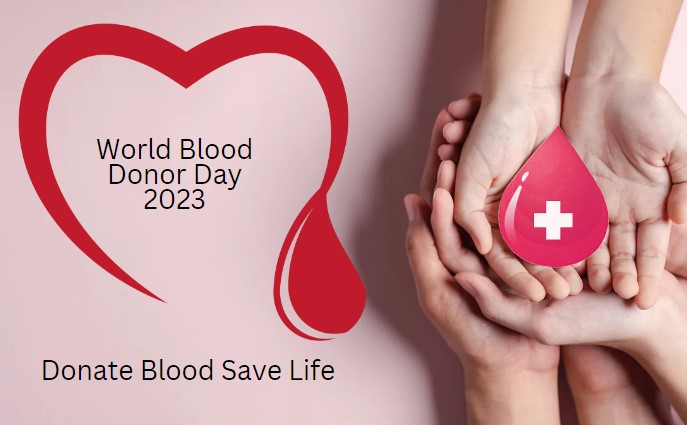Today, is World Blood Donor Day 2023: It is a moment to ponder and act – “Give blood, give plasma, share life, share often”. The Blood Donor Day is celebrated annually on June 14, and this year marks another opportunity to raise awareness about the crucial need for safe blood and blood products.
Established in 2004 by the World Health Organization (WHO), the International Federation of Red Cross and Red Crescent Societies, the International Federation of Blood Donor Organizations, and the International Society of Blood Transfusion, this day aims to recognize and express gratitude to blood donors worldwide for their invaluable contributions in saving lives.
World Blood Donor Day 2023: The Significance of Blood Donation
Blood is a life-sustaining fluid that carries oxygen, nutrients, and hormones throughout our bodies. It plays a vital role in various functions, including the formation of blood clots to prevent excessive bleeding. Safe blood transfusions are essential for medical procedures, trauma cases, surgeries, childbirth, and treating various diseases and conditions. Regular blood donations ensure a sufficient supply of blood, reduce the risk of blood shortages, and support transfusion-dependent patients.
Benefits of Blood Donation
While blood donation undoubtedly benefits those in need, it also offers significant advantages to the donors themselves. Here are some key benefits of donating blood:
Improved Physical Health: Regular blood donation helps maintain the overall well-being of donors. It stimulates the production of fresh red blood cells, which promotes the regeneration of blood tissues and boosts cardiovascular health. Additionally, it can help in managing iron levels in the body, reducing the risk of heart diseases.
Enhanced Mental Well-being: Engaging in acts of kindness, such as blood donation, has been linked to improved mental health. Donating blood can evoke a sense of fulfillment and purpose, which contributes to reduced stress levels and increased psychological well-being.
Health Check-Up: Every blood donation involves a thorough health screening. This includes testing for various infectious diseases, such as HIV, hepatitis, and syphilis. By donating blood regularly, individuals can stay updated on their health status and detect potential health issues early on.
Community Bonding: Blood donation drives bring communities together for a common cause—saving lives. Participating in these events fosters a sense of unity and social responsibility, creating a supportive and compassionate society.
World Blood Donor Day 2023: Call to Action
On this World Blood Donor Day, and even other days let us join hands to make a significant impact on the lives of countless individuals in need. By donating blood, you have the power to save lives, improve your own well-being, and create a healthier and more caring world. Schedule an appointment at your nearest blood donation center, or join a local blood drive event to contribute to this noble cause. Remember, every drop counts, and your selfless act can bring hope and happiness to someone in their darkest hour.
Who can give blood?
Age: Most countries have an age requirement of 18 to 65 for blood donation. In some places, 16-17 year-olds may be eligible with appropriate consent, while regular donors over 65 may be accepted at the discretion of the responsible physician.
Weight: Donors generally need to weigh at least 50 kg (45 kg for some countries’ whole blood donations of 350 ml ± 10%).
Health: Donors must be in good health at the time of donation. They should not have cold, flu, sore throat, cold sore, stomach bug, or any other infection. If they recently had a tattoo or body piercing, a waiting period of 6 months or 12 hours (if performed by a registered health professional) may apply. For dental procedures, a waiting period of 24 hours to a month may be required. Meeting the minimum hemoglobin level is also crucial (e.g., not less than 12.0 g/dl for females and not less than 13.0 g/dl for males in many countries).
Travel: Travel to areas with mosquito-borne infections or specific countries/areas may result in a temporary deferral due to the risk of infections or variant Creutzfeldt-Jakob Disease (vCJD) transmission.
Behaviors: Individuals who engaged in “at-risk” sexual activity within the past 12 months or have a history of HIV, recreational drug injection are generally deferred permanently. Additional behavioral eligibility criteria may vary by country.
Pregnancy and breastfeeding: Following pregnancy, the deferral period should last as many months as the duration of the pregnancy. Donating blood while breastfeeding is not advisable, and the deferral period after childbirth is typically at least 9 months (as for pregnancy) and until 3 months after significant weaning.
More Information on Eligibility:
It’s important to follow national eligibility guidelines when donating blood. Each country’s blood service may have specific requirements regarding health conditions, medications, professions, and travel history that could affect eligibility. For detailed information, individuals can refer to their national or local blood services.
So on World Blood Donor Day 2023 – Together, let’s make a difference—be a lifesaver, donate blood, and share the precious gift of life!
[Important: Remember to follow the guidelines and eligibility criteria provided by your local blood donation center before donating blood.]


